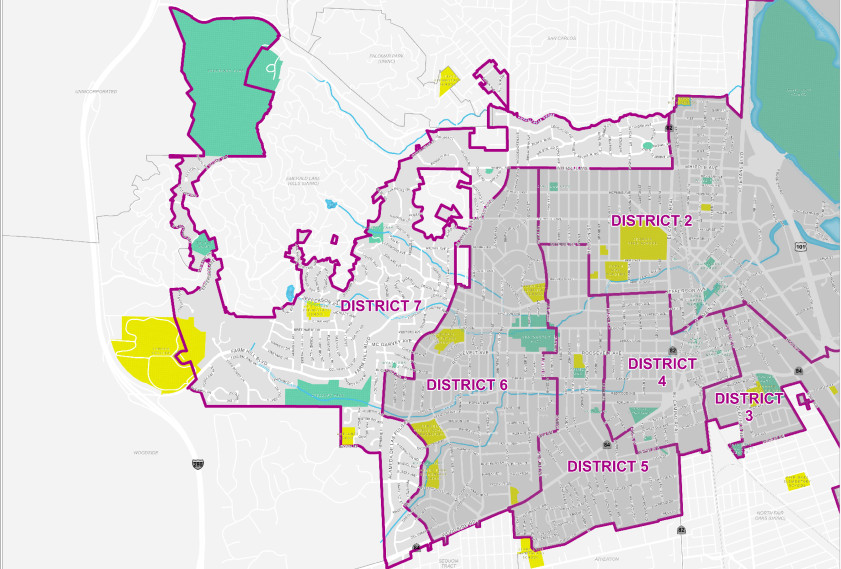The following is the third of four columns covering the November election for City Council of Redwood City. This installment reports on the District 7 race. Previous coverage includes the District 4 election here and the District 1 election here.
—
Already the longest continuously serving member of the current Redwood City Council, Alicia Aguirre, if elected to her fourth full term on November Nov. 3 has the chance to serve a total of 19 years, which would make her the longest–tenured councilmember in the modern, term-limits era.
It should come as no surprise, then, that Aguirre’s longevity is a central issue in the District 7 city council race, whether as an asset, as she asserts in her own campaign materials, which say the mid-Covid crises that face City Hall call for “tested leadership.”
Or whether her longevity calls out for change, as her opponents assert. Former Redwood City police officer Chris Rasmussen says in his own campaign materials that “it is time for NEW leadership in Redwood City.” And nonprofit program facilitator Mark Wolohan promises to bring to city government “a fresh perspective.”
“I think we’re going through really challenging times,” Aguirre said, but the council is a positive balance “of folks who have been there a while and a lot of new people coming on the council. … I’ve been there through the (2008-09) recession, all the changes, housing concerns, transportation challenges.”
At a time when the city went through some upheaval to create two council districts that are minority-majority, and predominantly Hispanic, Aguirre notes that she is the only Latino on the council and the only Latina on any city council in the county. “I believe that my district and the city respect diversity and inclusivity,” Aguirre said.
“People in my district want change,” said Rasmussen, whose 30-year police career included a lengthy tenure as the department’s lead community officer, which brought him wide contact with the people and issues of the city, particularly in working with the homeless. Change, he said, takes the form of “thinking outside the box, challenging the status quo and not just rubber-stamping things that could be better or different. They want to be listened to and I’m hearing (from them) that the council isn’t listening to them. I’m a real person and not just a politician.”
As a prime example, Rasmussen cites the city’s failure to resolve its housing crisis. “Decades of inaction have only exacerbated the problem,” he said.

Wolohan, a lifelong renter in Redwood City who works at the Riekes Center in Menlo Park, described himself as a “fresh candidate without ties to any people or organizations acting out of self-interest.” He will wage an entirely grassroots campaign and accept no financial donations. “I think I could be of tremendous service to the community. It’s not like I’m doing this for status or power. … I want to channel a lot of voices that are maybe overlooked. … Being a person who doesn’t have any affiliation with local government is an actually an advantage. It gives me a more unbiased, clear perspective.”
District 7 is the city’s westernmost district, essentially covering all the area from Alameda de las Pulgas to the western hills, including the Farm Hills neighborhood. It is the least diverse district – 70 percent White, only 9 percent of residents speak Spanish. It is the city’s second-wealthiest district and has the highest percentage of residents with household incomes over $200,000. Eighty-seven percent of the residences are single-family homes and 79 percent of residents are homeowners.
Aguirre argues that her experience is precisely what is needed to see the city through the Covid-driven financial crisis that has been devastating to the local economy and caused a substantial city budget shortfall.
As a sitting councilmember, she is participating in the discussions, spearheaded by city staff, about how the budget must be cut. “It’s difficult to say (where to cut) without knowing the (staff) recommendations,” Aguirre said. Reducing staff compensation “should be one of the last resorts,” she said. “If we’re not looking out for them, who is?”
Rasmussen said “taking care of our people” should be the first priority. “Take care of our employees,” who are charged with taking care of the city and its residents. He acknowledged he is “not well-informed” on where cuts must be made in the budget. “There are no easy answers.”
Like his two opponents, Wolohan also offered no specifics. “We’ve got to look at inefficiencies and minimize them, make things more cost-efficient across the board.” He said it’s unnecessary to increase taxes because the financial downturn probably means less demand on city services. And employee compensation has to be part of the discussion over cuts. “To say we’re not going to look at 70 percent of the budget is malpractice,” Wolohan said.
Given the nature of the district’s housing, dominated by single-family homes and home ownership, It it would be understandable that the issue of housing would be pre-eminent.
The housing shortage cries out for converting the office buildings constructed and approved in the last decade to residential, Wolohan said. “Converting is a cheaper form of construction than starting from scratch,” he said. Cheaper also means more affordable housing for more people. “People are willing to live in units that don’t have washers and dryers, pools and granite counter tops,” Wolohan said. Such a redirection of policy will “alleviate the affordable crisis without a fiscal burden on the city.”
Rasmussen was much more critical of the city’s “inaction” on housing. “There’s nothing happening as far as affordable (housing),” Rasmussen said. “The whole city has not come out with creative ideas and moved on them. Homelessness is on the rise. What we are doing to protect our community and not drive (people) away?” The city needs to actively encourage more workforce housing and “to support the affordable housing we have” instead of “knocking them down and building monster homes for millions and millions of dollars.” He supports multi-unit buildings, approving single-occupancy units that can be placed in backyards or above a garage.”
The race for District 7 is uniquely situated for the discussion about the city’s police, future funding, conduct and shifting of priorities. As the only Latina on the council, it is expected that Aguirre will bring an additional perspective on how the police department interacts with the city’s substantial Latino community. And Rasmussen, as the only candidate with a law enforcement background, would seem to have an additional perspective on what can be expected of the police department facing pressure to make changes.
Rasmussen said the city needs more community policing, a law enforcement policy that puts police more directly in touch with neighborhoods and residents, beyond simply responding to emergency calls. And the department needs more standards and training, he said.
Rasmussen said he supports the push for a citizens police oversight commission, but he is adamant that it needs to be run by an outside agency, not the city or a group of council appointees from Redwood City. It has to be run “by someone not aligned with the police department, someone completely objective, not appointed by the city manager to just brush over stuff, Rasmussen said.
“Change is going to come from the top down. It’s going to have to be cultural. I’ve spoken up in my department about excessive force complaints. We need more officers to speak up and we need not have officers retaliated against when they do speak out,” Rasmussen said.
Aguirre, who serves on the council ad hoc committee studying policing in the city, said, “Our community has spoken pretty loud on how we need reform and what that looks like,” she said. That would include a citizens commission and greater transparency about complaints of excessive force, she said.
“I’m really open to looking at what oversight looks like and having the community involved in that,” Aguirre said. And she understands the push to shift away from police duties that might fall under the heading of social services. “We’re looking at different options and everything’s on the table. Let’s set the model,” she said.
Wolohan said he is “open and receptive” to a citizens oversight commission. “It could potentially create more transparency.” But, he cautioned, “I’m definitely not an extremist who thinks the police is an unnecessary entity.”
He also suggested a higher fitness standard might decrease the need by police to use force. An officer on the force for 20 years might not have the necessary level of fitness to respond incidents that require physical action, making the officer more inclined to use undue force. “If they’re more sound fitness-wise, they might have a little more confidence in handling situations, if things go south,” Wolohan said.
Contact Mark Simon at mark.simon24@yahoo.com.
*The opinions expressed in this column are the author’s own and do not necessarily reflect the views of Climate Online.






